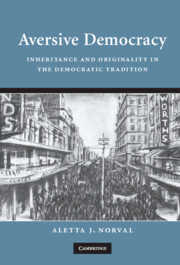Book contents
- Frontmatter
- Contents
- Acknowledgements
- Introduction: towards an aversive account of democracy
- 1 Democracy, universalization and (dis)agreement
- 2 Democratic argumentation: rhetoric and imagination
- 3 Democratic identification and aspect change
- 4 Democratic subjectivity: the promise of democratic community
- 5 Conclusion: aversive democracy – exemplarity, imagination and passion
- Bibliography
- Index
Introduction: towards an aversive account of democracy
Published online by Cambridge University Press: 22 September 2009
- Frontmatter
- Contents
- Acknowledgements
- Introduction: towards an aversive account of democracy
- 1 Democracy, universalization and (dis)agreement
- 2 Democratic argumentation: rhetoric and imagination
- 3 Democratic identification and aspect change
- 4 Democratic subjectivity: the promise of democratic community
- 5 Conclusion: aversive democracy – exemplarity, imagination and passion
- Bibliography
- Index
Summary
We don’t start from certain words, but from certain occasions or activities.
The democratic elections in South Africa and the subsequent experience of the Truth and Reconciliation Commission, both of which exemplify the so-called Third Wave of democratization, raise vital questions for democratic theory. For example, how do democratic practices become embedded in a society; and what is the relationship between these processes and the assumption of democratic subjectivity? How do we account for the articulation of political demands and its relation to the constitution of political identity and community? While these issues appear rather stark in the context of societies undergoing democratic transitions, they are not irrelevant to the workings of more established democracies. Even in societies with long traditions of democracy, the question of political community, the forging and expression of political demands, and the fostering of democratic forms of citizenship, remain extremely important. In the latter contexts, these issues arise in a slightly different form. They are not principally concerned with the initial establishment of democratic forms of subjectivity and community, but with their maintenance and reactivation. However, it would be mistaken to regard these two sorts of questions as they arise in the different contexts as entirely different in character, for this would assume too large a gap between processes of innovation and the reactivation of tradition.
- Type
- Chapter
- Information
- Aversive DemocracyInheritance and Originality in the Democratic Tradition, pp. 1 - 17Publisher: Cambridge University PressPrint publication year: 2007



